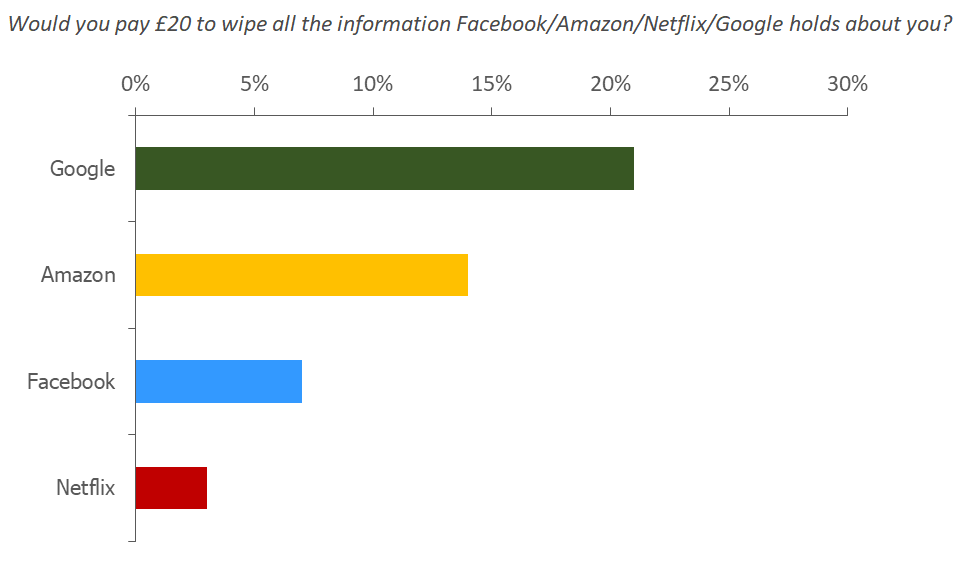The Worth: Internet Privacy
Posted: 30/11/2018


“The highest proportion would pay to wipe their data from Google and Amazon”

Earlier this year, we learned Facebook allowed political consulting firm Cambridge Analytica access to around 87 million users data, in what founder Mark Zuckerberg called a “breach of trust”. This news intensified discussions on the collection and use of personally identifiable information by social networks and websites. To measure the British public’s concern, we asked respondents whether they would pay to wipe all the information a particular company holds about them. Using a randomised controlled trial, we varied the amounts shown to respondents and randomly assigned them to one of four companies – Google, Amazon, Facebook or Netflix.
Of the respondents who would pay £20 to wipe their information, the highest proportion would pay to be forgotten by Google (21%) and Amazon (14%). Only 7% are willing to pay to wipe their Facebook data and 3% would for Netflix.
Considering recent publicity, it may be surprising that the British public are not more concerned about Facebook. One explanation may be that users think Facebook holds a specific set of data and they have a relatively good understanding of how that’s used. They write comments, upload photos, like pages etc. and then receive targeted advertising, which is not a worrying use and it’s within their control. The social network giant is also on the decline in Europe, so account holders likely feel less reliant on Facebook now and may reason they can wipe their data by closing their account.
In contrast, Google hold a wide and diverse range of data across several services and devices that the public are reliant on. Google records a user’s entire search history, GPS data through Google Maps, personal files through Google Drive and viewership history through YouTube. Their reach is extensive, with over 80% of internet users in Britain using Google as their search engine. With such a varied array of data, the potential applications are vast, and people may feel they don’t understand or have control over the ways in which they are being tracked and manipulated.
Amazon accrues a narrower set of user data than Google, yet consumers still show high willingness to pay. This is perhaps due to the personal nature of the data, including PayPal account information, bank details, home and work addresses, as well as less sensitive information about their lifestyle and shopping habits. Amazon also owns a number of subsidiary brands which increase the data collected.
Netflix shows the lowest willingness to pay, perhaps because they know relatively little about their users and because customisation based on past viewing is found to be a useful tool.
Overall, this shows Brits have differentiated levels of concern about the way huge corporations are using their data, showing the strongest concern for those more embedded in their lives, rather than those actively opted in to.